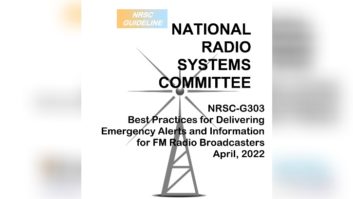Cumulus Tackles Susquehanna Integration
ATLANTA Gary Kline admits to never facing a larger assignment in his 20-year career as a broadcast engineer.
Some Susquehanna Managers Cut LooseYORK, Pa. When Cumulus Media agreed to acquire Susquehanna Radio Corp. in the fall of 2005, Norm Philips began to wonder about his position as vice president of engineering for the York, Pa.-based broadcaster. He knew job cuts can be expected after a merger or major acquisition, as positions are trimmed to cut costs and eliminate redundancy. However, that doesn’t make it any easier to live through.
“Cumulus never talked to me about a position,” said Philips, who spent 29 years with Susquehanna in a variety of engineering posts. His last day with Susquehanna was in early May after the sale was finalized.
Philips said he enjoyed working for Susquehanna, the largest privately owned radio broadcasting company in the United States prior to the sale. The company became known for an employee-friendly philosophy, even going so far as running advertisements in various broadcast trade engineering publications touting the accomplishments of its engineers.
“There is a difference in operating philosophies between Susquehanna and Cumulus. I’m not saying that is good or bad, just different,” Philips said.
He expressed pride in the engineering team he helped build at the broadcaster’s 33 radio stations.
A former colleague, Chris Lawton, was manager of network services for Susquehanna Media, a division that was not included in the sale but whose employees were responsible for network IT services and digital automation systems across Susquehanna’s radio and cable operations.
“We were not sure what was happening (when the sale was announced) because we were not hearing much about our futures. However, most of the things we were responsible for in Susquehanna Media were eventually rolled into Cumulus corporate responsibilities and then to some local stations,” Lawton said.
He said a lot of people working in engineering and IT at Susquehanna were affected, “not only in corporate but at the station level. There were major staff cuts in many markets. Some local engineering and IT staffs were cut in half,” he said.
Since his position was eliminated in early May, Lawton has focused his attention on a startup company called Network Minded Inc. The company, founded by Lawton in 2004 as a part-time business, provides professional broadcast services ranging from studio builds, HD-R installations, IT design, training and consulting.
Lawton said Philips and several other former Susquehanna employees are hoping to join him in the new venture.
– by Randy J. Stine
Integrating the engineering and IT departments of Cumulus Media Inc. and Susquehanna Radio in a six-month span has challenged both his time management skills and resourcefulness. Kline believes his work and the efforts of others have resulted in streamlined station-level engineering and IT departments for the newly created Cumulus Media Partners.
The consolidation has, however, come at a cost to some former Susquehanna engineering and IT employees who were let go after the merger.
The $1.2 billion deal, which closed in May, combined the operations of 33 former Susquehanna radio stations and some 300 Cumulus Media stations. The new entity owns or operates 345 stations in 67 U.S. markets.
Cumulus Media Partners is a newly formed private partnership created by Cumulus Media Inc., Bain Capital, The Blackstone Group and Thomas H. Lee Partners.
Even before the acquisition was announced in October of 2005, Kline, who is Cumulus Media’s vice president of engineering and IT, was working on the project.
HD-R conversions
“I’m in a position to know about those things early on in discussions,” he said. “That way I’m prepared with some feedback if asked by the executive team to share my thoughts. I also participated in the final hours of discussions in conference calls with lawyers and the corporate teams, discussing critical diligence and capital items that, as an engineer, I want to make sure were contained in the final agreement.
“For example, if Susquehanna had money already on their books allocated for HD-R conversions and money spent on upgrades like new consoles or remote vans for specific markets, I want to make sure those monies are carried over and left in their budgets and are not lost in the shuffle.”
Kline said the HD Radio efforts of the newly created Cumulus Media will not be affected. “Nothing has changed with our commitment to Ibiquity and the HD (Radio) Alliance. Susquehanna had a strong commitment to HD Radio and we will continue with the conversions they had planned. We have nine additional former Susquehanna stations to convert yet this year.”
Once the deal became public knowledge, Kline began to work on the specifics of the integration.
“We had six months to bring this together,” he said, referring to the proposed closing date. “I did have some previous knowledge of Susquehanna’s facilities and knew some of the people they had in specific positions. As part of my due diligence I visited all of Susquehanna’s tower sites and studio locations. I also wanted to learn what their engineering operations were like while looking for similarities or differences that we would have to address,” Kline said.
Company acquisitions and mergers often involve bringing together entities with differing philosophies. Sources familiar with both companies indicate there were some cultural differences in the radio groups. Susquehanna was seen by many in the radio industry as a broadcaster that placed an emphasis on employee relations and retention, while Cumulus Media Inc. has been viewed by some as a company that operates with leaner staffing levels.
Similarities, differences
Kline said he began by focusing on Susquehanna’s IT department. What made the particular process unique is that Susquehanna Media, which handled IT for both the radio and cable operations, was not included as part of the deal.
“We began a process of discovery where over a two-month span we worked with their applications and network groups to learn every application and system they ran. We then decided which system to adopt and began the process of who we would staff here at Cumulus to handle those duties.”
In the end, the decision was made to transfer all IT work from the Susquehanna data center in York, Pa., to Cumulus Media’s corporate offices in Atlanta.
“It’s economies of scale, really. We didn’t need to maintain two separate operating systems like e-mail. We standardized on our own set of customized financial data reporting systems and tools, too,” he said.
There were some similarities in audio gear used by Susquehanna and Cumulus that made systems integration a bit more straightforward. Both groups use a lot of Wheatstone gear, Kline said, adding that Susquehanna “used a sophisticated T1 line for links to transmission sites for audio and data. We use the same types at Cumulus.”
However, the two companies differ on digital audio systems. Susquehanna had standardized on ENCO Systems while Cumulus Media actually owns radio automation software supplier Broadcast Software International. “There has been no merging of systems in that regard. Our stations are using what fits their needs in specific markets. We are not moving in any specific direction right now,” Kline said.
Cumulus Media Inc. has committed to Harris Broadcast to provide HD Radio equipment, including transmitters, exciters and STLs. Kline said Harris will remain the exclusive supplier of HD transmission products for the newly created entity.
The two broadcasters shared only two media markets, Houston and Kansas City, where Kline was presented with another set of circumstances to consider.
“We had to decide which facilities to keep and where to consolidate operations. There were also staffing considerations in those markets,” he said.
In both cases, Cumulus stations are integrating into existing Susquehanna facilities. Office staff and management have relocated in Kansas City with “studios moved by the end of the year,” Kline said. The newly created Cumulus Media Partners will operate six stations there.
In Houston, construction will begin this summer on an addition to the former Susquehanna building. When the project is completed by the end of the year it will house FM stations KIOL, KFNC and KRBE.
Staffing changes
Kline confirmed that Cumulus Media has made personnel cuts to the engineering and IT departments at the former Susquehanna stations.
“In rare instances we had to let people go. There were some cuts in some Susquehanna markets that couldn’t justify the need.
“In cases where we made cuts, we did our best to accommodate them with jobs in other markets when possible,” Kline said. “There was really an extensive review in the eight Susquehanna markets that involved local market managers as well.”
Kline declined to specify how many Susquehanna engineers were laid off. A source familiar with the merger said approximately 13 Susquehanna technical employees were released out of approximately 40 technical personnel.
Former Susquehanna Vice President of Engineering Norm Philips was the highest-ranking engineering department executive to leave the company when the acquisition closed in early May (see sidebar).
Kline said the 33 former Susquehanna stations now employ a total of 29 full-time employees in engineering, which includes engineers, IT support, web designers and remote coordinators in eight markets. In all, the newly created Cumulus Media Partners will have approximately 80 engineers and IT staffed for 345 radio stations.
“We have given the local engineers and IT folk’s additional responsibilities in their individual markets. We will train them in terms of programming their own routers and give them greater control over their local market domain e-mail systems. We think anytime an engineer can learn something news and increase their experience level is a good thing,” Kline said.
Cumulus will retain regionalized layers of engineering management, Kline said.
The eight markets where Susquehanna had stations – San Francisco, Dallas, Houston, Atlanta, Cincinnati, Kansas City, Indianapolis and York, Pa. – will for the time being be considered one region. Kline is “interviewing in-house” for the regional engineer to oversee the former Susquehanna stations.
The only remaining obstacles from the merger are “only things we haven’t discovered yet” that might arise, Kline said.
“I have so much confidence in the experience level of the former Susquehanna engineers. I can’t imagine there is anything left out there that they can’t handle. They have been terrific,” Kline said.












